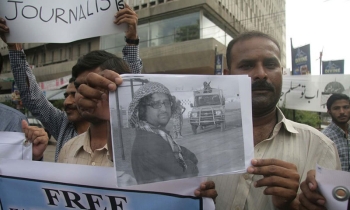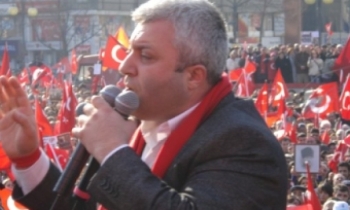WASHINGTON (Reuters) - A member of the European Parliament said on Thursday that the White House has pressured journalists not to name certain European countries in their reports about CIA detention practices on the continent.
Claudio Fava of Italy, charged with writing a European Parliament committee report on possible secret CIA prisons and detainee transfers in Europe, did not identify the journalists, newspapers or television networks he said had been pressured.
"We think that the detailed confirmation we have of pressure being exerted by the White House on journalists not to name certain European countries is an extremely important point for our work," said Fava, who was visiting Washington as part of a 13-member delegation from the European Parliament, the European Union's legislature.
Administration officials were not immediately available for comment.
Speaking at a news conference, Fava did not say why he believed the Bush administration would want to stop media outlets from identifying European countries and he provided no further details.
The Washington Post reported last November that the CIA had run secret prisons for al Qaeda suspects in Eastern Europe. The campaign group Human Rights Watch later identified Poland and Romania as likely hosts on the basis of flight records showing CIA planes using local air strips.
Both countries have denied the claim. But the report has stirred outrage across Europe and spawned a number of investigations, including the European Parliament's, which have yet to unearth anything definitive.
'NO COMMENTS'
The European delegation, which is due to wrap up its week-long visit to Washington on Friday, also complained about being stonewalled by Bush administration officials and shunned by Republican members of Congress.
"There was an exorbitant number of 'no comments,'" Fava said earlier on Thursday, after an hour-long meeting with senior State Department officials.
"But we are going to go back to Europe with valuable information, and we do consider that even a 'no comment' can be construed as providing valuable information."
He likened the U.S. approach to a soccer player who starts a match with a violent foul, saying the Americans set a tone of noncooperation by stating from the outset the visitors had no jurisdiction over the U.S. government.
The Bush administration has neither denied nor confirmed the CIA ran secret prisons and generally refuses to discuss details of flights to transfer terrorism suspects.
Washington's contentions that it respects nations' sovereignty, must use tough tactics against militants and does not outsource torture have done little to defuse the anger, although allied governments have generally accepted the explanations.
Fava said that, while the delegation got no information about specific cases, it was important to put the United States on the spot.
"I take satisfaction from their embarrassment, satisfaction from the difficulty they have in giving a concrete answer to a concrete question," the leftist Italian told reporters.
State Department legal adviser John Bellinger, who described Thursday's meeting as a good and respectful discussion, said the United States refuses to discuss cases involving intelligence information.
"We reiterated, as we have in the past, that as much as we would like to be able to deny the many allegations out there that are simply incorrect, that we have regretfully concluded that we simply cannot comment on specific allegations," Bellinger told reporters.
The European committee has no legal powers but can recommend political actions against any countries found to have been involved, including the United States.









